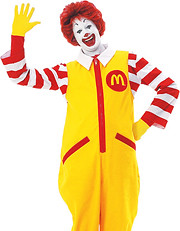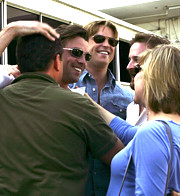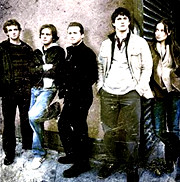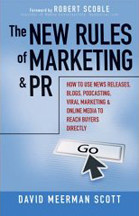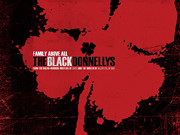By now, you might have heard that McDonald's hired six "quality correspondent" mommy bloggers to report on the "world at large" about various McDonald's facilities. And, no surprise, for every friendly blogger found, an equal number of contrary bloggers will magically appear. (Or maybe it's the other way around, I forget.)
It's nothing new. Ever since marketing genius Ray Kroc made a deal with the McDonald brothers in 1954, America has had an odd love-hate relationship with Ronald, or least the product he sells.
On one hand, McDonald's is a great American rag-to-riches story of a businessman who created an American icon and believed in hard work, wholesome idealism, and selfless philanthropy. On the other hand, critics say Kroc cut the McDonald brothers out, exploited teenagers, despoiled the environment, hardened our arteries, and made us fat.
Even Greenpeace showed its split decision back in 2003: "We don't like a lot of what it [McDonald's] does and what it stands for but we have to take a deep breath here, and give them some credit where it is due. They've done something [environmentally friendly refrigeration] to help the planet!"
So what's the truth?
Given the recent New York City quick service regulation story, it points to a cultural trend being blamed on social media even though it didn't originate with social media. The trend is the polarization of, well, everything.
Polarization is a tendency to promote every issue as black and white; for or against; right and wrong. It considers consensus waffling at best and knuckling under at worst. It originated with traditional media, often dominates politics, and has been slowly and steadily creeping its way into almost anything we do.
The irony is most polarized issues, whether it is a big issue like global warming or a little issue like McDonald's, are a battle of wills. Usually, it means wingnuts (people with extreme views) have hijacked an issue in the hope that they can appeal to your emotions while you surrender your ability to reason.
To briefly understand wingnut influences, imagine a bell curve. They are the 10 percent on either side, with the rest of us being in the middle. If the wingnuts succeed in moving the middle just a little bit, they can change the direction of Congress. Sometimes, however, the bell curve gets pressed down in the middle (making it look like an M) or, in extreme cases, the middle is almost obliterated (making it look like a U).
Thus, in the case of McDonald's, anti-McDonald's wingnuts have gained some ground using social media as a mechanism. To help offset this, McDonald's did what bloggers have been asking every company to do: pay more attention to bloggers. So they invited a few seemingly pro-McDonald's mommies to take a peek inside and blog about it.
Well, anti-McDonald's wingnuts can't have this, so they want to discredit the mommy bloggers before they write a single word. Really, it's not all that different from the Nikon blogger outreach program (except these mommy bloggers, I am told, are really on the payroll) and as long as they disclose, who really cares?
The simple truth about McDonald's is that like any indulgence, excess is bad (and we didn't need some fool who ate only McDonald's for a month to prove it); the existence of McDonald's does not make you fat (only eating excess quantities of, well, anything will make you fat); and mommy bloggers are not unethical if they disclose, even if they say something silly like it's part of a balanced meal (assuming they buy that). Of course, if they write that, all it means is that they will diminish their own credibility.
You know, I'm starting to believe that America's appetite for convenience is not fueling McDonald's as much as it fueling polarization in America. It's convenient to have only two choices. It's convenient to discredit bloggers as having no influence until they write something we don't like. And, it's very, very convenient to blame other people for our own inability to control what we say, do, or eat.

It's nothing new. Ever since marketing genius Ray Kroc made a deal with the McDonald brothers in 1954, America has had an odd love-hate relationship with Ronald, or least the product he sells.
On one hand, McDonald's is a great American rag-to-riches story of a businessman who created an American icon and believed in hard work, wholesome idealism, and selfless philanthropy. On the other hand, critics say Kroc cut the McDonald brothers out, exploited teenagers, despoiled the environment, hardened our arteries, and made us fat.
Even Greenpeace showed its split decision back in 2003: "We don't like a lot of what it [McDonald's] does and what it stands for but we have to take a deep breath here, and give them some credit where it is due. They've done something [environmentally friendly refrigeration] to help the planet!"
So what's the truth?
Given the recent New York City quick service regulation story, it points to a cultural trend being blamed on social media even though it didn't originate with social media. The trend is the polarization of, well, everything.
Polarization is a tendency to promote every issue as black and white; for or against; right and wrong. It considers consensus waffling at best and knuckling under at worst. It originated with traditional media, often dominates politics, and has been slowly and steadily creeping its way into almost anything we do.
The irony is most polarized issues, whether it is a big issue like global warming or a little issue like McDonald's, are a battle of wills. Usually, it means wingnuts (people with extreme views) have hijacked an issue in the hope that they can appeal to your emotions while you surrender your ability to reason.
To briefly understand wingnut influences, imagine a bell curve. They are the 10 percent on either side, with the rest of us being in the middle. If the wingnuts succeed in moving the middle just a little bit, they can change the direction of Congress. Sometimes, however, the bell curve gets pressed down in the middle (making it look like an M) or, in extreme cases, the middle is almost obliterated (making it look like a U).
Thus, in the case of McDonald's, anti-McDonald's wingnuts have gained some ground using social media as a mechanism. To help offset this, McDonald's did what bloggers have been asking every company to do: pay more attention to bloggers. So they invited a few seemingly pro-McDonald's mommies to take a peek inside and blog about it.
Well, anti-McDonald's wingnuts can't have this, so they want to discredit the mommy bloggers before they write a single word. Really, it's not all that different from the Nikon blogger outreach program (except these mommy bloggers, I am told, are really on the payroll) and as long as they disclose, who really cares?
The simple truth about McDonald's is that like any indulgence, excess is bad (and we didn't need some fool who ate only McDonald's for a month to prove it); the existence of McDonald's does not make you fat (only eating excess quantities of, well, anything will make you fat); and mommy bloggers are not unethical if they disclose, even if they say something silly like it's part of a balanced meal (assuming they buy that). Of course, if they write that, all it means is that they will diminish their own credibility.
You know, I'm starting to believe that America's appetite for convenience is not fueling McDonald's as much as it fueling polarization in America. It's convenient to have only two choices. It's convenient to discredit bloggers as having no influence until they write something we don't like. And, it's very, very convenient to blame other people for our own inability to control what we say, do, or eat.






